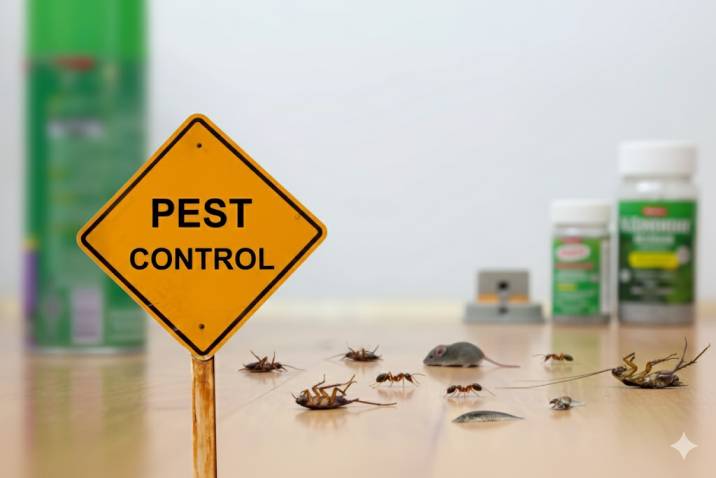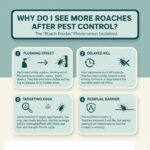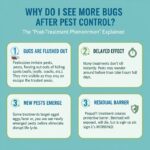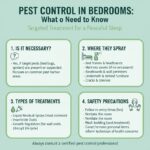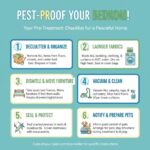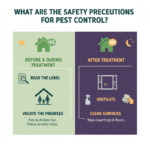Pest control is about finding and dealing with pests like insects, rats, mice, or weeds. These pests can cause trouble by spreading sickness, damaging things, or simply being a big disturbance.
To manage them, different methods are used. Some common ways include traps, sprays, or using natural predators that can keep pests away.
The main goal of pest control is to reduce or stop pests from entering homes, offices, or farms, so people can live and work in a safe and clean place.
Key Takeaways
Pest control helps protect health, food, and property by keeping harmful pests away. It reduces the chances of illness and prevents serious damage in homes, workplaces, and farms.
Common pests like ants, termites, cockroaches, rodents, and mosquitoes are the main cause of trouble for families and businesses.
To manage them, different approaches are used such as cleaning, trapping, applying pesticides, or using natural solutions, depending on the type of pest.
Professional pest control experts carry out inspections, choose the right treatment, and provide follow-up checks to make sure the problem doesn’t return.
Regular pest management is a smart investment because it lowers long-term costs, creates safer spaces, and gives peace of mind by keeping pests under control.
Common Pests in Workplaces and Homes
Many pests are often found in offices and houses across Ohio. These unwanted guests can cause problems for both people and property.
- Rodents: Rats and Mice
- Cockroaches
- Ants
- Termites
- Mosquitoes
- Bees
- Spiders
- Centipedes
- Silverfish
Know more about the most common pests in and how to spot them early to protect your home and family.
Pest Control as Part of Facilities Management
Every business owner understands how fast pests can turn into a serious problem in offices, shops, or even residential spaces. They do more than damage property; they also spread illness and put food at risk of contamination.
That is why pest control plays an important role in a complete facilities management service.
By hiring a trusted pest control team, businesses can feel confident that their buildings stay protected from pests.
These experts carry out regular checks to spot signs of infestation early and create a treatment plan that fits the specific problem.
They also guide staff on steps to stop pests from coming back again.
When pest control is handled by professionals, business owners can focus on their work without worrying about unwanted pests disturbing the workplace.
Common Methods of Pest Control
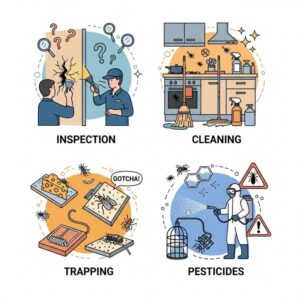
Pest control can be managed through different methods depending on the type of pest and the level of infestation. Common approaches include:
- Inspection: Checking the area for signs of pests.
- Cleaning: Removing food, waste, or clutter that attracts pests.
- Trapping: Using traps to catch or remove pests.
- Pesticides: Applying chemicals when needed to control infestations.
Professionals often adjust their methods to fit the exact problem they are dealing with. In some cases, biological solutions like using natural predators or parasites are also applied to reduce pest populations.
Unlike guarding against people, stopping pests from getting inside a property can be much harder and needs special care. Pests spread illness, spoil food, and damage property, so effective control is very important.
Not every method works the same for every pest:
- Baiting is more effective for rodents.
- Trapping is often better for cockroaches and insects.
Most pest control companies use a mix of techniques rather than relying on just one, ensuring that the problem is fully handled and less likely to come back.
Why is Pest Control Necessary?
Pest control is more than just removing bugs or rodents when they appear. It plays a key role in keeping homes, workplaces, and farms safe and healthy for the long term. By controlling pests, people can avoid many problems before they even start.
- Protection: Helps prevent serious damage to houses, offices, furniture, and even crops.
- Health & Safety: Keeps away pests that may spread diseases or trigger allergies.
- Prevention: Stops future infestations and provides long-term relief.
- Food Safety: Protects stored food and supplies from being contaminated or spoiled.
- Peace of Mind: Reduces stress by keeping living and working spaces comfortable and pest-free.
- Cost Savings: Prevents large repair or replacement costs that often come from pest damage.
- Better Environment: Creates a cleaner and safer place for families, employees, and customers.
If you’re searching for pest control near me for reliable and local pest removal services, call us to get professional help in keeping your space pest-free.
FAQs: What is Pest Control?
What do you mean by pest control?
Pest control means taking steps to manage unwanted pests in order to reduce their effect on daily life and surroundings. The methods used depend on the type of pest and the level of infestation.
This approach ensures that the problem is not just treated for now but also prevented from coming back.
What is the meaning of pest control services?
Pest control services are professional companies or experts who inspect, prevent, and treat pest problems in different places such as homes, workplaces, and farms. They use proper techniques to handle infestations safely and effectively.
Hiring professionals saves time and helps avoid major damage or health risks in the future.
What is pest control used for?
Pest control is mainly used to keep people safe from diseases that pests can spread. It also helps prevent serious damage to property and buildings caused by termites, rodents, or insects.
Another important use is in farming, where pest control protects crops and improves yield. It also keeps stored food and supplies safe from contamination.
In the end, pest control creates a clean, safe, and healthy place for families, employees, and customers.
How does pest control work?
Pest control works through different methods that reduce or remove pests from a given area. The common approaches include chemical, biological, physical, and cultural techniques.
Chemical treatments use pesticides to kill pests, while biological methods rely on natural predators or pathogens to control them. Physical options may include traps and barriers, and cultural practices aim to change the environment so pests cannot survive easily.
What pest control services do?
Pest control services begin with a detailed inspection to find the type of pest and the level of infestation. Based on this check, they prepare a treatment plan that matches the specific problem.
After applying the treatment, many companies also provide monitoring and follow-up visits to make sure pests do not return.
After the plan is made, experts use the right control methods and continue to monitor the area. They also provide regular maintenance to make sure the pests do not return and the property stays safe.
Why is pest control important?
Pest control is important because it protects people from diseases carried by insects, rodents, and other pests. It also prevents serious damage to houses, offices, and farms caused by termites, rats, and similar pests.
Food safety is another important benefit of pest control. It helps avoid contamination, keeps crops healthy, and protects stored supplies from being spoiled. Pest management also supports the environment by stopping invasive species from upsetting the natural balance.
What are pests in pest control?
Pests are unwanted creatures that bring harm to people, property, or nature. They can also create problems in farming, livestock, and everyday living.
Common examples include insects such as ants, cockroaches, and termites. Rodents like rats and mice, along with birds, weeds, and other nuisance pests, also fall into this category.
What is pest control treatment?
Pest control treatment is the use of different methods to reduce or remove pests from a home, business, or farm. The aim is to keep the place safe and stop infestations from spreading.
These treatments may involve pesticides, traps, or natural remedies depending on the type of pest. Pest control services select the right approach for each case to provide effective and lasting results.
Are pest control services safe for humans and pets?
Professional pest control companies focus on keeping people and pets safe while removing pests. They use approved products that are tested for safety and follow proper application methods.
Many services also offer eco-friendly or pet-safe options when needed, giving families extra peace of mind.
Can pest control be done at home or work without professionals?
Basic pest control can be managed at home or in the workplace through regular cleaning, sealing gaps, and setting traps. These steps help prevent common pests from entering and spreading.
But when infestations grow larger or involve pests like termites, bed bugs, or rodents, calling professional pest control is the safest and most effective option.
What are the examples of pest control?
An example of physical pest control is pest proofing, which means creating barriers to stop pests from getting into your home, office, or garden. It may also involve removing nests or breeding spots.
By cutting off entry points and destroying places where pests live, the chances of a new infestation are greatly reduced.
What chemicals are used for pest control?
Most pest control companies use pesticides called pyrethrins and pyrethroids, which include chemicals like permethrin. These are made to act like natural compounds that are found in certain types of chrysanthemums.
They are widely used because they work well against many pests while being safe when applied correctly.
How much does pest control cost?
The cost of pest control services can vary depending on the type of pest and the level of infestation. Prices are also different for one-time treatments compared to regular maintenance plans.
Factors like the size of the property and the methods used also affect the total cost.
What is the hardest pest to get rid of?
Some of the most difficult pests to remove are bed bugs, termites, and cockroaches. These pests are known for hiding in very small spaces and reproducing quickly.
They are also resistant to many common pesticides, which makes them hard to eliminate fully without professional help.
How long does pest control last?
The results of a pest control treatment usually last anywhere from 30 to 90 days. In some cases, certain products like gel baits can continue to work for 3 to 6 months.
The exact duration depends on the type of pest, how bad the infestation is, and environmental conditions like weather. For severe problems, monthly treatments may be needed at first, followed by quarterly visits to keep pests away.
Conclusion
Pest control is more than just getting rid of pests when they show up. It’s about protecting your health, keeping your property safe, and making sure food and supplies are not at risk.
Whether at home, in the office, or on the farm, the right pest management plan creates a clean and safe place to live and work.
With regular prevention, proper treatments, and routine checks, families and businesses can enjoy peace of mind without worrying about infestations.
If you want reliable protection from unwanted pests, connect with Pest Control Cincinnati for services that fit your exact needs.

